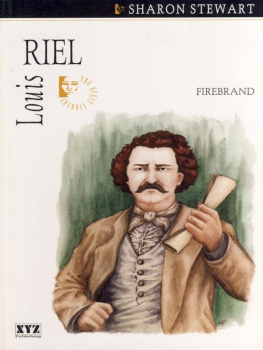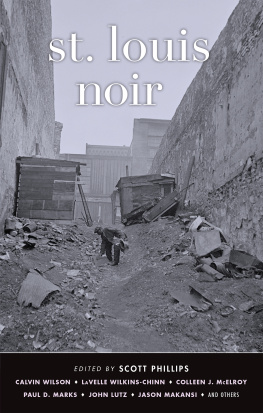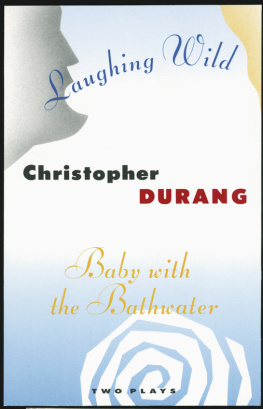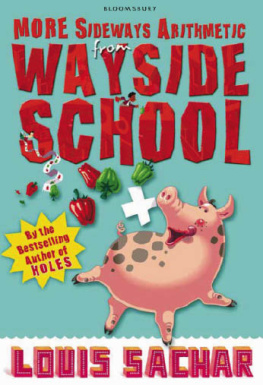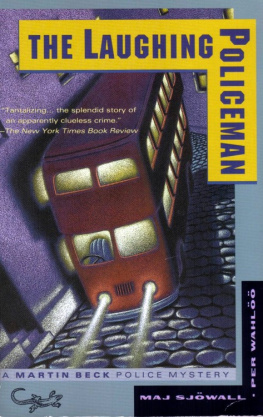Louis Adamic - Laughing in the Jungle
Here you can read online Louis Adamic - Laughing in the Jungle full text of the book (entire story) in english for free. Download pdf and epub, get meaning, cover and reviews about this ebook. City: Salem, N.H., United States, year: 1985, publisher: Ayer Company, genre: Art. Description of the work, (preface) as well as reviews are available. Best literature library LitArk.com created for fans of good reading and offers a wide selection of genres:
Romance novel
Science fiction
Adventure
Detective
Science
History
Home and family
Prose
Art
Politics
Computer
Non-fiction
Religion
Business
Children
Humor
Choose a favorite category and find really read worthwhile books. Enjoy immersion in the world of imagination, feel the emotions of the characters or learn something new for yourself, make an fascinating discovery.
- Book:Laughing in the Jungle
- Author:
- Publisher:Ayer Company
- Genre:
- Year:1985
- City:Salem, N.H., United States
- Rating:4 / 5
- Favourites:Add to favourites
- Your mark:
- 80
- 1
- 2
- 3
- 4
- 5
Laughing in the Jungle: summary, description and annotation
We offer to read an annotation, description, summary or preface (depends on what the author of the book "Laughing in the Jungle" wrote himself). If you haven't found the necessary information about the book — write in the comments, we will try to find it.
Laughing in the Jungle — read online for free the complete book (whole text) full work
Below is the text of the book, divided by pages. System saving the place of the last page read, allows you to conveniently read the book "Laughing in the Jungle" online for free, without having to search again every time where you left off. Put a bookmark, and you can go to the page where you finished reading at any time.
Font size:
Interval:
Bookmark:
LOUIS ADAMIC

AYER COMPANY, PUBLISHERS, INC. SALEM, NEW HAMPSHIRE 03079
Reprint Edition 1985 AYER Company. Publishing. Inc. 382 Main Street Salem, New Hampshire 03079
Reprinted by arrangement with Harper & Row, Publishers All rights reserved
Library of Cong ress Catalog Card No. 69-18755
Manufactured in the United States of America isbn 0-405-00503-2
Laughing in the Jungle
The Autobiography of an Immigrant in America By
Louis Adamic
Harper & Brothers
New York and London
LAUGHING IN THE JUNGLE
Copyright, 1932, by Louis Adamic
Printed in the United States of America
To
MADS EN
Author s Note
Part I: Why I Came to America
I . Am er kan c i
II . Do Not Go to America!
III . I Go to America
Part II: Greenhorns
IV. Steve Rodin
V. New Year s Eve in New York
VI. The Jungle
VII. Steve Rodin (continued)
VIII My Own People in America
Part III: The Crusade
IX. To Make the World Safe
X. Superman
XI. The Man with the Big Head
XII. Blakelock in Command
XIII. Koskaandthe Flu
XIV. Blakelock Makes a Gesture
Part IV: The Land of Laughs
XV. After the War
XVI. My First Day in Los Angeles
XVII . The Enormous Village
XVIII. Lonie BurtonStill a Crusader
XIX. The Assassin of Woodrow Wilson
XX. A Soft Joband Mencken
Part V: Some People in California
XXI. The Man with a Soul
XXII. A Bohunk Woman
XXIII. Steve Rodin (concluded)
XXIV. America and Mysetf
Postscript
T his book is a narrative of the influences which, in 1913, prompted me as a boy of fourteen and a half to leave my native country in Europe an d go to America, and of things within my experience as an immigrant living in various parts of the United States that seem interesting or significant, or merely amusi n g to me personally, and give themselves to telling at this time. It does not pretend to be a complete autobiography (if such a thing is ever possible).
Immigration was a large factor in the upbuilding of America. The immigrant flood during the last seven or eight decades, and especially from about 1890 to 1914, included large numbers of my countrymen Bohunks, or Hunkies : Slavs from the Balkans and from eastern and central Europewhose contribution as workers to the current material greatness and power of the United States, albeit not generally recognized, is immense... Much of our work and our strength is frozen in the buildings of New York, and in the buildings of other cities, and in the railroads and bridges of America....
On the other hand, of course, immigration is in no small way to blame for the fact that the United States today is more a jungle than a civilizationa land of deep economic, social, spiritual, and intellectual chaos and distressin which, it seems to me, by far the most precious possession a sensitive and intelligent person can have is an active sense of humor.
Immigration now is ended. The United States is pulling down the Welcome sign. This fact appears to me one of the most significant in America s national existence today. Hence, perhaps, it is not inappropriate for, or presumptuous of, me at this time to add a volume to the rather meager shelf of autobiographical books by immigrants.
L oui s A damic
October, 1931
Amerikanci in Carniola
As a boy of nine, and even younger, in my native village of Blato, in Carniolathen a Slovenian duchy of Austria and later a part of YugoslaviaI experienced a thrill every time one of the men of the little community returned from America.
Five or six years before, as I heard people tell, the man had quietly left the village for the United States, a poor peasant clad in homespun, with a mustache under his nose and a bundle on his back; now, a clean-shaven Amerikanec, he sported a blue-serge suit, buttoned shoes very large in the toes and with india-rubber heels, a black derby, a shiny celluloid collar, and a loud necktie made even louder by a dazzling horseshoe pin, which, rumor had it, was made of gold, while his two suitcases of imitation leather, tied with straps, bulged with gifts from America for his relatives and friends in the village. In nine cases out of ten, he had left in economic desperation, on money borrowed from some relative in the United States; now there was talk in the village that he was worth anywhere from one to three thousand American dollars. And to my eyes he truly bore all the earmarks of affluence. Indeed, to say that he thrilled my boyish fancy is putting it mildly. With other boys in the village, I followed him around as he went visiting his relatives and friends and distributing presents, and hung onto his every word and gesture.
Then, on the first Sun day after his homecoming, if at all possible, I got within earshot of the nabob as he sat in the winehouse or under the linden in front of the wine-house in Blato, surrounded by village folk, ordering wine and klobase Carniolan sausagesfor all comers, paying for accordion-players, indulging in tall talk about America, its wealth and vastness, and his own experiences as a worker in the West Virginia or Kansas coal-mines or Pennsylvania rolling-mills, and comparing notes upon conditions in the United States with other local Ameri k a mci who had returned before him.
Under the benign influence of cvichek Lower Carniolan wineand often even when sober, the men who had been in America spoke expansively, boastfully, romantically of their ability and accomplishments as workers and of the wages they had earned in Wilkes-Barre or Carbondale, Pennsylvania, or Wheeling, West Virginia, or Pueblo, Colorado, or Butte, Montana, and generally of places and people and things and affairs in the New World. The men who returned to the village, either to stay or for a visit, were, for the most part, natural men of labormen with sinewy arms and powerful backs Bohunks, or Hunkies, so called in the United States who derived a certain brawny joy and pride from hard toil. Besides, now that they had come home, they were no longer mere articles upon the industrial labor market, working stiffs or wage slaves, as radical agitators in America referred to them, but adventurers, distant kinsmen of Marco Polo safely returned from a far country, heroes in their own eyes and the eyes of the village; and it was natural for them to expand and to exaggerate their own exploits and enlarge upon the opportunities to be found in America. Their boasting, perhaps, was never wholly without basis in fact. ...
I remember that, listening to them, I played with the idea of going to America when I was but eight or nine.
My notion of the United States then, and for a few years after, was that it was a grand, amazing, somewhat fantastic placethe Golden Countrya sort of Paradise the Land of Promise in more ways than onehuge beyond conception, thousands of miles across the ocean, un-tellably exciting, explosive, quite incomparable to the tiny, quiet, lovely Carniola; a place full of movement and turmoil, wherein things that were unimaginable and impossible in Blato happened daily as a matter of course.
In America one could make pots of money in a short time, acquire immense holdings, wear a white collar, and have polish on one s boots like a gospod one of the gentryand eat white bread, soup, and meat on weekdays as well as on Sundays, even if one were but an ordinary workman to begin with. In Blato no one ate white bread or soup and meat, except on Sundays and holidays, and very few then.
Font size:
Interval:
Bookmark:
Similar books «Laughing in the Jungle»
Look at similar books to Laughing in the Jungle. We have selected literature similar in name and meaning in the hope of providing readers with more options to find new, interesting, not yet read works.
Discussion, reviews of the book Laughing in the Jungle and just readers' own opinions. Leave your comments, write what you think about the work, its meaning or the main characters. Specify what exactly you liked and what you didn't like, and why you think so.

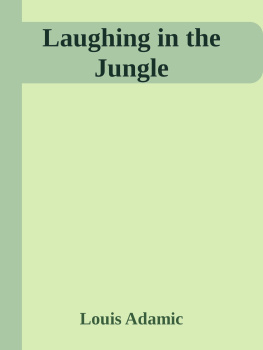


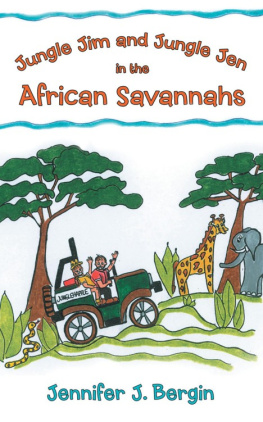
![Louis de Montfort - The Saint Louis de Montfort Collection [7 Books]](/uploads/posts/book/265822/thumbs/louis-de-montfort-the-saint-louis-de-montfort.jpg)
